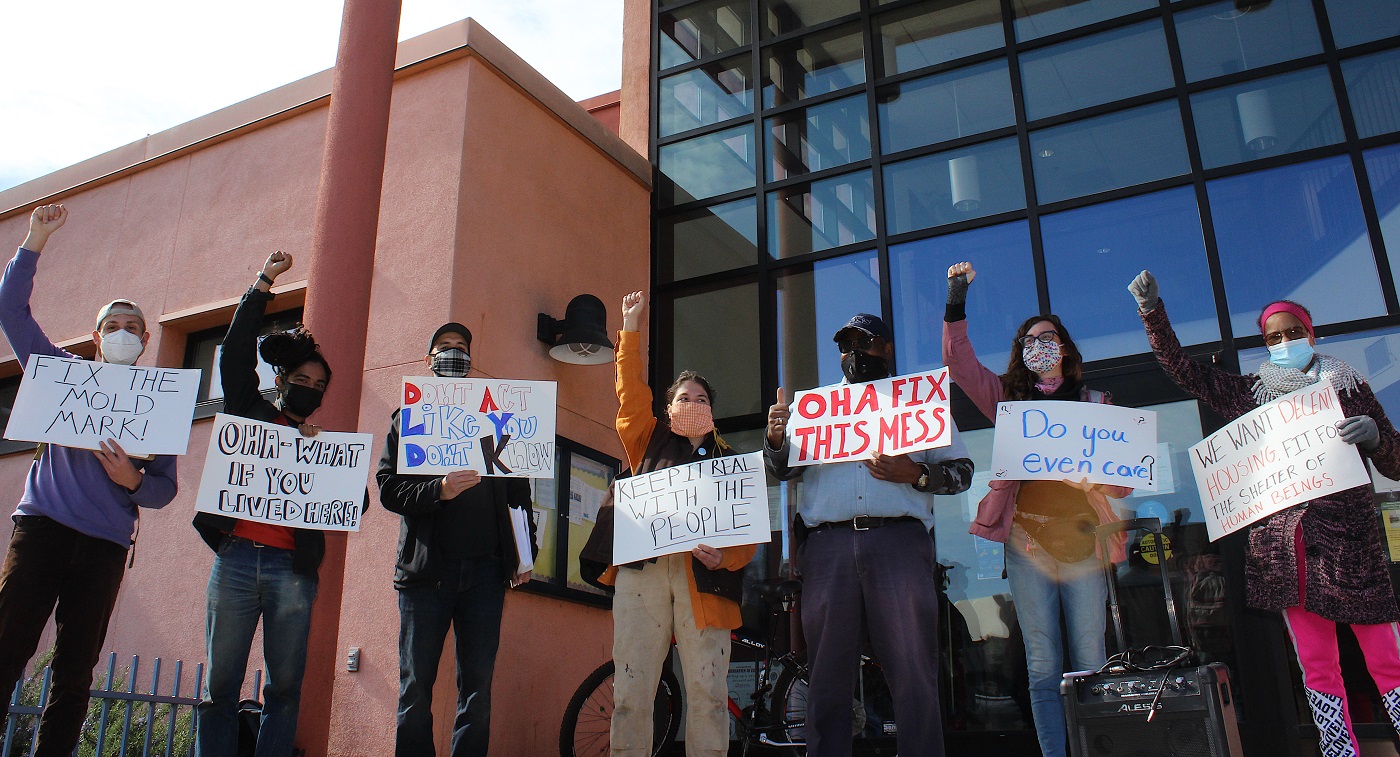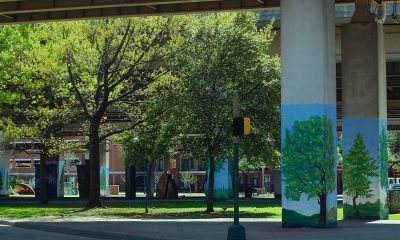Activism
Peralta Village Tenants and Supporters Protest Oakland Housing Authority Office
“I would like for the tenants to come together more and not fear retaliation,” said Eddie Simmon, who has lived in Peralta Village for over 20 years, at the protest. “The more the tenants vent their frustrations as a group, the better [OHA] will respond.”

Peralta Village tenants and supporters gathered outside of Oakland Housing Authority’s [OHA] offices from noon to 1:00 p.m. on February 13 to protest what they see as insufficient maintenance and unfair threats of eviction despite Alameda County’s and Oakland’s COVID-19 related eviction moratoriums.
Peralta Village is a public housing project in West Oakland consisting of 390 units and over 700 residents. It was founded just after World War II as segregated, all-Black housing. Today, many of the residents, almost all of whom are still Black, feel they are being treated unfairly. Some are coming together to demand change.
“I would like for the tenants to come together more and not fear retaliation,” said Eddie Simmon, who has lived in Peralta Village for over 20 years, at the protest. “The more the tenants vent their frustrations as a group, the better [OHA] will respond.”
A February 1 article from this publication showed tenants who complained of black mold, overflowing trash, inconsistent clean up, an inoperable overhead light despite services requests dating back a year, a six-week delay to repair a window that would not shut, a lack of recycling services, and eviction threats despite the moratorium. In reaction to these circumstances, 85 Peralta Village tenants signed and delivered a petition to OHA demanding better treatment.
Shortly after the article’s publication and residents delivered their petition, about a dozen tenants received a notice from Oakland Rent Adjustment Program informing them that eviction notices OHA had sent “may have been served in error and/or in contradiction to the current laws in place prohibiting most forms of eviction in Oakland.”
The notice also broadly outlined rights tenants have under Oakland’s eviction moratorium. Under a section marked “What should you do if you’ve received an eviction notice?,” the notice reads “You are likely not required to move at this time.”
“If you didn’t have knowledge of what the [eviction notices] represent, you think it’s a serious threat but, in reality, it’s just intimidation,” said Dayton Andrews at the protest. Andrews is a member of The United Front Against Displacement, an anti-gentrification group that has been organizing with Peralta Village tenants for better treatment from OHA.
An OHA spokesperson, Greer McVay, said that OHA has not threatened to evict any residents during the COVID-19 emergency for non-payment of rent. But some residents report they have received three-day notice or quit notices from OHA, not due to rent non-payment, but due to OHA accusing them of breaking its rules.
Oakland’s Rent Adjustment Board classifies such notices as eviction notices. Still, no residents have claimed that OHA has followed through on such evictions and, when interviewed for the February 1 article, McVay claimed OHA is not currently evicting any residents.
In an interview with The Oakland Post, an OHA worker who asked not to be named due to fear of retaliation said that through discussions with OHA’s upper management and personal experience on the job, the recent eviction notices were delivered as a “bully tactic.” The worker also was sympathetic to resident complaints about rodents, inconsistent trash pick-up, and slow repairs.
“[For] every resident I’ve been in contact with,” the worker said, “it’s the same story. As an insider, there’s no reason why they should live in those types of conditions. It’s so baffling for us.”
Residents claim trash still regularly overflows from Peralta Village dumpsters and onto the streets, sometimes blowing near their homes. OHA’s McVay, said the agency has increased its trash clean-up services under COVID-19 but blames much of the mess on illegal dumping that she claims comes from outside of Peralta Village.
In response to residents’ complaints about mold, McVay said OHA “actively works with residents to resolve [mold] issues if noted during a unit inspection” or if tenants report such a problem, and that OHA’s “primary goal is to educate residents on mildew and mold prevention.”
McVay said OHA is prioritizing emergency repairs under COVID-19, which are addressed within “four to 24 hours depending on the severity” and that “non-emergencies are based on the availability of the maintenance crew.”
Residents claim that even during emergencies their requests for maintenance often get delayed for weeks or months and that favoritism, not COVID-19, causes delays.
“They’ll look at the list [of maintenance requests] and they’ll choose which apartment they want to go to,” said an OHA tenant at the protest who asked not to be named due to fear of retaliation. “It’s not in the order of the call. That’s what I hate!” This resident claimed they had to wait six weeks for OHA to fix a window in her unit that would not close.
Mark Schiferl, director of Property Management for OHA, has recently called and e-mailed both The United Front Against Displacement and some residents mentioned in the February 1 article to ask about problems residents complained about.
JaCynthia Givens, a resident who complained about black mold, and Simmon, who complained about insufficient trash pick-up and cleaning of shared outdoor common areas, said Schiferl called them. They said Schiferl listened to them but has not yet offered plans to fix their problems. He did not respond to requests to comment on this article.
Simmon was pleased that Schiferl reached out. “It felt like we got somebody’s attention finally,” said Simmon, “because this guy is calling me and I’m just another tenant.”
Residents and their supporters are hoping that by protesting and organizing, OHA will respond to repair requests in a more effective quicker manner, stop eviction threats, and keep the neighborhood cleaner. To get OHA’s attention they posted signs on OHA’s office doors during the February 13 protest. One read “FIX THE MOLD MARK!” and another read “OHA FIX THIS MESS!”
Although 10 people showed up to the protest, the demands the protestors made have much broader support as 91 Peralta Village residents, about 12% its total population, have now signed the petition demanding better treatment from OHA. OHA tenants and supporters are hoping more people show up to support their demands at future actions.
“It’s going to take a bunch of us coming together to get anything done,” said Simmon.
“We’re out here to prove to folks that the sky’s not going to fall if you take a stand,” said Andrews at the protest. “And things are only going to get worse if you don’t.”
The United Front Against Displacement is encouraging residents to call them at 510-815-9978 or email them at wewontgo@riseup.net if they want to sign the petition and/or get involved in future actions.
Activism
Oakland Post: Week of April 17 – 23, 2024
The printed Weekly Edition of the Oakland Post: Week of April 17 – 23, 2024

To enlarge your view of this issue, use the slider, magnifying glass icon or full page icon in the lower right corner of the browser window. ![]()
Activism
Oakland Schools Honor Fred Korematsu Day of Civil Liberties
Every Jan. 30, OUSD commemorates the legacy of Fred Korematsu, an Oakland native, a Castlemont High School graduate, and a national symbol of resistance, resilience, and justice. His defiant stand against racial injustice and his unwavering commitment to civil rights continue to inspire the local community and the nation. Tuesday was “Fred Korematsu Day of Civil Liberties and the Constitution” in the state of California and a growing number of states across the country.

By Post Staff
Every Jan. 30, OUSD commemorates the legacy of Fred Korematsu, an Oakland native, a Castlemont High School graduate, and a national symbol of resistance, resilience, and justice.
His defiant stand against racial injustice and his unwavering commitment to civil rights continue to inspire the local community and the nation. Tuesday was “Fred Korematsu Day of Civil Liberties and the Constitution” in the state of California and a growing number of states across the country.
One OUSD school is named in his honor: Fred T. Korematsu Discovery Academy (KDA) elementary in East Oakland.
Several years ago, founding KDA Principal Charles Wilson, in a video interview with anti-hate organization “Not In Our Town,” said, “We chose the name Fred Korematsu because we really felt like the attributes that he showed in his work are things that the children need to learn … that common people can stand up and make differences in a large number of people’s lives.”
Fred Korematsu was born in Oakland on Jan. 30, 1919. His parents ran a floral nursery business, and his upbringing in Oakland shaped his worldview. His belief in the importance of standing up for your rights and the rights of others, regardless of race or background, was the foundation for his activism against racial prejudice and for the rights of Japanese Americans during World War II.
At the start of the war, Korematsu was turned away from enlisting in the National Guard and the Coast Guard because of his race. He trained as a welder, working at the docks in Oakland, but was fired after the bombing of Pearl Harbor in 1941. Fear and prejudice led to federal Executive Order 9066, which forced more than 120,000 Japanese Americans out of their homes and neighborhoods and into remote internment camps.
The 23-year-old Korematsu resisted the order. He underwent cosmetic surgery and assumed a false identity, choosing freedom over unjust imprisonment. His later arrest and conviction sparked a legal battle that would challenge the foundation of civil liberties in America.
Korematsu’s fight culminated in the Supreme Court’s initial ruling against him in 1944. He spent years in a Utah internment camp with his family, followed by time living in Salt Lake City where he was dogged by racism.
In 1976, President Gerald Ford overturned Executive Order 9066. Seven years later, the 9th Circuit Court of Appeals in San Francisco vacated Korematsu’s conviction. He said in court, “I would like to see the government admit that they were wrong and do something about it so this will never happen again to any American citizen of any race, creed, or color.”
Korematsu’s dedication and determination established him as a national icon of civil rights and social justice. He advocated for justice with Rosa Parks. In 1998, President Bill Clinton gave him the Presidential Medal of Freedom saying, “In the long history of our country’s constant search for justice, some names of ordinary citizens stand for millions of souls … To that distinguished list, today we add the name of Fred Korematsu.”
After Sept. 11, 2001, Korematsu spoke out against hatred and discrimination, saying what happened to Japanese Americans should not happen to people of Middle Eastern descent.
Korematsu’s roots in Oakland and his education in OUSD are a source of great pride for the city, according to the school district. His most famous quote, which is on the Korematsu elementary school mural, is as relevant now as ever, “If you have the feeling that something is wrong, don’t be afraid to speak up.”
Activism
WOMEN IMPACTING THE CHURCH AND COMMUNITY
Juanita Matthews, better known as “Sister Teacher,” is a walking Bible scholar. She moved to California from the great state of Arkansas in 1971. Sister Teacher has a passion for teaching. She has been a member of Bible Fellowship Missionary Baptist Church since 1971.

Sister Juanita Matthews
55 Years with Oakland Public School District
The Teacher, Mother, Community Outreach Champion, And Child of God
Juanita Matthews, better known as “Sister Teacher,” is a walking Bible scholar. She moved to California from the great state of Arkansas in 1971. Sister Teacher has a passion for teaching. She has been a member of Bible Fellowship Missionary Baptist Church since 1971. She followed her passion for teaching, and in 1977 became the lead teacher for Adult Class #6. Her motto still today is “Once My Student, Always My Student”.
Beyond her remarkable love for the Lord, Sister Teacher has showcased her love for teaching by working for the Oakland Unified School District for 55 years, all but four of those years spent at Emerson Elementary and Child Development School. She truly cares about her students, making sure they have the tools/supplies needed to learn either at OUSD or Bible Fellowship Missionary Baptist Church.
She’s also had a “Clothes Closet Ministry” for 51 years, making sure her students have sufficient clothing for school. The Clothes Closet Ministry extends past her students, she has been clothing the community for over 50 years as well. She loves the Lord and is a servant on a mission. She is a loving mother to two beautiful children, Sandra and Andre. This is the impact this woman of God has on her church and the community.
-

 Activism4 weeks ago
Activism4 weeks agoOakland Post: Week of March 20 – 26, 2024
-

 #NNPA BlackPress3 weeks ago
#NNPA BlackPress3 weeks agoCOMMENTARY: D.C. Crime Bill Fails to Address Root Causes of Violence and Incarceration
-

 #NNPA BlackPress4 weeks ago
#NNPA BlackPress4 weeks agoFrom Raids to Revelations: The Dark Turn in Sean ‘Diddy’ Combs’ Saga
-

 #NNPA BlackPress3 weeks ago
#NNPA BlackPress3 weeks agoMayor, City Council President React to May 31 Closing of Birmingham-Southern College
-

 #NNPA BlackPress4 weeks ago
#NNPA BlackPress4 weeks agoCOMMENTARY: Lady Day and The Lights!
-

 Activism3 weeks ago
Activism3 weeks agoOakland Post: Week of March 27 – April 2, 2024
-

 #NNPA BlackPress4 weeks ago
#NNPA BlackPress4 weeks agoBaltimore Key Bridge Catastrophe: A City’s Heartbreak and a Nation’s Alarm
-

 #NNPA BlackPress4 weeks ago
#NNPA BlackPress4 weeks agoBaltimore’s Key Bridge Struck by Ship, Collapses into Water

















































